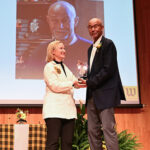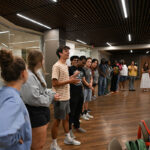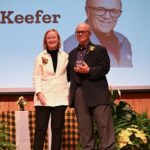
Computer science major builds a robotic mouse for an algorithm maze
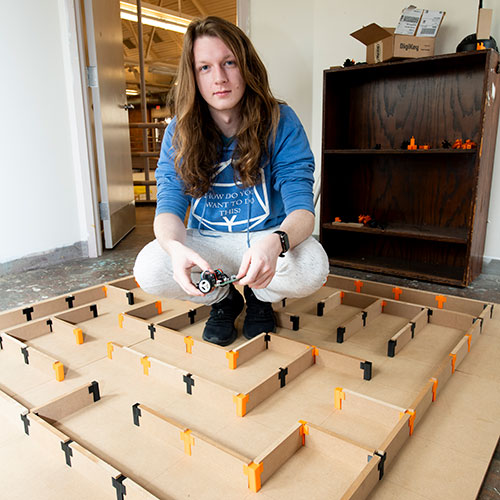
Computer science major Levi Gainer ’24 has big aspirations to work in robotics or with large language models (computer algorithms that recognize and generate language). For his senior Independent Study at The College of Wooster, Gainer took a micro approach at combining the two interests. He designed, built, and programmed a 9-inch MicroMouse robot to solve a maze.
Prior to Wooster, Gainer competed in national robotics challenges where he 3D-printed and raced drones. The rigor of college classes kept him from pursuing additional competitions—until senior year. “I knew I wanted to do something with robotics for my I.S. because I hadn’t gotten to compete in that arena since high school,” said Gainer.
He set his sights on the February 2024 Applied Power Electronics Conference (APEC) MicroMouse Contest hosted by the Institute of Electrical and Electronics Engineers (IEEE). It’s the largest MicroMouse competition in the U.S. and one of the top 3 international MicroMouse competitions in the world.
The competition features speed runs of the robotic mice to see which one can navigate through a 16-square-foot maze in the shortest time. Robots must move around to explore the maze automatically (without any guidance). They discover where the walls are using distance sensors and keep track of their movements and where various paths lead. By the end of five runs, each mouse uses the data it collected to solve the maze as efficiently as possible, and the robot with the fastest time wins. Simply put: engineering and algorithms are the name of the game.
“There are several interesting problems embedded into this competition that are at the heart of computer science—automatic driving and finding the fastest path from point A to point B,” said Heather Guarnera, assistant professor of computer science, who served as Gainer’s I.S. mentor. While Gainer spent a lot of class time looking at code, this project gave him applicable experience integrating hardware components in a complicated way— getting them to communicate when they aren’t necessarily meant to, and finding ways to improve on competitors’ building techniques.
Gainer received Copeland Funding, a College fund dedicated to assisting seniors conducting their I.S. research, to buy approximately 70 parts to build the robot including sensors, a circuit board, motors, wheels, and more. “I had to build my robot conceptually before I even had the parts to begin,” said Gainer. “I researched every component in the first two weeks of school, so I could apply for funding, and the written portion of my study explains how I chose the hardware that ended up on the MicroMouse,” said Gainer.
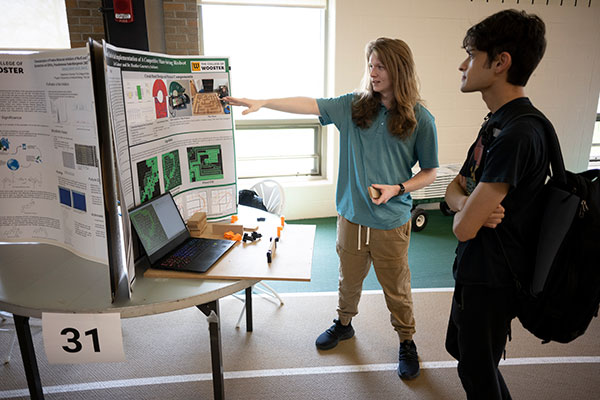
Gainer was able to present his research alongside his fellow seniors at the 2024 I.S. Symposium.
He also received funding for materials needed to construct a maze and for travel to and from APEC. With Guarnera’s help, Gainer was granted access to a studio art room to store his self-designed, massive wooden maze, which fit by one inch on one side. “I didn’t know what resources were available to me and had never heard of Copeland Funding,” said Gainer. “Dr. Guarnera had lots of ideas on who to talk to and believed in my project whether or not I was confident about how it was going. She was incredibly helpful.”
Guarnera’s Algorithm Analysis class also gave Gainer a strong foundation for programming the robot. He researched and/or implemented multiple algorithms including breadth-first search, depthfirst search, A*, and flood fill. She applauded his software implementation as well as his hardware design, especially his plan to use a drone motor to create a vacuum effect that sucks the mouse down to the floor for greater traction and quicker turns.
Unfortunately, just weeks before the competition, Gainer ran into a complex circuitry issue that couldn’t be fixed within budget or time constraints. He wasn’t able to compete at APEC, but switched over to a simulation model to complete his study. “I turned the code I would have put on the MicroMouse into a computer program and basically ran a digital mouse through a digital maze,” said Gainer.
Despite the outcome, Guarnera was still incredibly impressed with what her mentee accomplished in the last year. “Levi has shown a tremendous amount of passion and dedication to his project,” she said. “His circuit design, software, and blueprint for the robot can still be used to fully construct a competitive MicroMouse for next year’s competition.”
Gainer learned from using maze algorithms that people like to find the shortest path, but they’re not always the fastest because they require extra turns. It’s a fitting parallel for his experience that’s taken longer than expected but will give him the unique build he envisioned. Finishing the mouse and competing will be his personal mission. He also wants future students to know it’s totally normal for projects to change in scope at any point. “No one really told me until after I had to change my scope, but I realized pretty much everyone ends up changing something,” said Gainer. “It’s important not to be too discouraged when things don’t go exactly the way you expect.”
This feature originally appeared in the Summer 2024 issue of Wooster magazine.
Posted in Independent Study, Magazine on July 11, 2024.
Related Posts
Related Areas of Study
Pre-Engineering
Start your path toward a career in engineering at Wooster and complete your degree at a top research university
Dual Degree Program Pre-Professional AdvisingComputer Science
Solve complex problems with creative solutions using computer programming and applications
Major Minor
